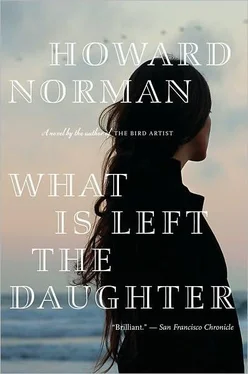"I hope the forklift breaks your other hip, Leonard," Cornelia said.
"Always a pleasure to see you, Cornelia. And the muffin was good as always," Leonard said. He set some money on the counter. "I'm a paying customer."
After Leonard drove off, Cornelia and I sat drinking coffee, not talking, admiring the new day out her window for a few minutes.
"Whew, what'd you think of your homecoming parade just now?" she asked.
"Not so harsh that I lost my appetite and can't finish these scones," I said, which made her laugh. "Have you seen Tilda this morning, by the way?"
"She has a rendezvous about this time every morning," Cornelia said.
"Where — with whom?"
"At the Parrsboro Wharf with her late husband," Cornelia said. "And I mean every morning. Mourns her husband. And she doesn't care who's watching — school kids to fishing crews, she doesn't care. You do something on that regular a basis, people not only get used to it, some eventually come to rely on it as a fixture. From what I've been told, she's very dignified about it."
"Every morning makes sense to me, since Hans was the love of her life."
"Hard to know what to think, really. She talks out loud and tells Hans about how things went for her yesterday. Things like that."
"When did these rendezvous begin?"
"Next day after Donald was escorted off to Halifax," Cornelia said. "Tilda out there on the wharf like that? Sometimes I think of it as admirable, but one thing's for sure — it's mysterious far beyond normal wifely obligation, no matter how devoted."
"Has she gone mad, Cornelia? Is it madness?"
"Often in a marriage, there's a husband you just don't know if he's hearing you or not, but the wife keeps trying." Cornelia smiled. "All kidding aside. No, if Tilda's mad at all, she's mad with guilt. If she didn't go to the wharf every morning, it might swallow her up, that guilt."
"Guilty of what?" I said.
"Like Tilda herself told me, she shouldn't have ever let Hans go to the house with you that night. Had she been along, Donald — she thinks — couldn't have committed that murder. I'm not sure I agree with her, but my opinion's hardly the point, is it?"
When I got back home, I went out to the shed. Inside, it was all stale air, and as far as the sleds and toboggans were concerned, there was much disarray. Tilda had peeled the U-boat news, all those headlines and articles, off the walls. I opened the windows and let the breeze in. Spider webs were in every corner. I swept those away with a broom. It had to have been Tilda who'd also organized, in separate stacks held by rubber bands, invoices, letters of request and other correspondence on the workbench. I sat opening and reading these for an hour or so and concluded, Well, you need to have some employment, let's see what you can do.
Skipping lunch, working well into the afternoon, I wrote to each of the twenty-three customers to whom a sled or toboggan was due — some for nearly two years! — beginning each letter with, My uncle Donald Hillyer is no longer employed in this line of work. I'm Wyatt Hillyer, his nephew, and I was apprenticed to him for a good while. I will be carrying on with the business. I think you will be satisfied with the results.
The thing was, Marlais, I had no idea whether I could manage the paperwork, let alone construct the sleds and toboggans on my own — and how many of these customers would still want their sled or toboggan? Yet what was my choice? Close to age twenty-three now, I had no other skills to peddle. Honestly, the thought of asking for work on a fishing or lobster boat crew was daunting, even laughable. Who would hire me? What was I in this village anymore?
Pariah, I worried. The rancor I'd felt fairly steaming off Leonard was the first step in confirming the fear that I'd brought shame to my neighbors. And come to think of it, on which side did my own private sympathies fall? Should Reverend Witt be praying for Hans Mohring's passage to heaven, or for my uncle's redemption? Why shouldn't Witt pray for both in the same breath? Minute by minute my thoughts would start out in a straight line toward a hopeful conclusion, then would suddenly detour and get lost. Naturally, I considered leaving Middle Economy for good. Just getting out. I even imagined that Randall Webb might hire me to work in his music shop. My childhood house on Robie Street was rented out, to a childless couple, last name of Pullman. I could give them notice. I could move back there.
Detour, detour, detour into late evening; finally, I was just grateful I'd left enough stew for supper a second night. Especially that French stew, because the flavors settled in more deeply. Have you ever noticed how that works with leftovers?
After supper, fully dark out, it started to rain and I switched on the front porch light. Washing the dishes, I looked out the window and saw rain spill over the iron birdbath Tilda had given Constance in the summer of 1940. Steven Parish had worked on it like a sculptor, adding a special feature, a circumference of dancing angels at the solid, heavy base. There was quite a downpour now. I put on a phonograph record from an album containing a set of Beethoven's sonatas for cello and piano — Sonata in A Major, Sonata in C Major and Sonata in D Major — then settled onto the sofa. I had wanted the Beethoven to transport me out of the world, but in a short time the music turned out to be only an accompaniment, not an antidote, to my restlessness. I lifted the needle, set it on its holder, turned off the gramophone, took a kerosene lantern from a shelf, set a lit match to the wick and carried the lantern out to the shed.
Once inside, I lit a second lantern and placed the two at opposite ends of the worktable, and this made for adequate light. I started in on the toboggan long promised to a Mr. and Mrs. Kormiker, originally from Iceland but now living in Copenhagen. Mr. Kormiker was in banking. On a visit to Halifax they'd seen my uncle's brochure, probably in one of the hotels. It was very professionally done, that brochure, not inexpensively produced, either. Steven Parish had provided drawings of sleds and toboggans, as he had done for his own brochure of iron works — fireplace tongs, candelabra, stovepipes and such — that he forged on commission.
Now, Marlais, you might ask, why start up again with this particular toboggan?
Because while going through all the correspondence, I'd read the letters that Mrs. Kormiker had sent to Donald and Constance. Eleven letters in all, each cordial and filling no more than three-quarters of a single page of personal stationery. Her written English was excellent. In one letter she wrote, "Our granddaughter is now two years of age. Is it possible to have a toboggan made by your hand delivered for her sixth birthday?" This letter was dated April 11, 1941—the war had allowed it to cross the Atlantic. What most struck me was the faith that a simple transaction in life, with patience — because think how far in advance they were planning — could eventually take place between people an ocean apart. A bargain had been struck, and I'd inherited an obligation. I felt desperate to do some small dignified thing. What's more, I figured that if the granddaughter was two in 1941, that meant if I worked hard on the toboggan, I might not be all that late.
Mr. and Mrs. Kormiker wanted a 12-by-3-foot three-board called a dog toboggan, with an upright backboard. I had to hire Steven Parish to forge the triangular hitch with handle. I'd been concerned he wouldn't want to do the work for me. But as it turned out, he was noticeably only a little less friendly than he'd always been, which wasn't too friendly at all. He looked at my rough sketch of the toboggan and said, "Sure, I'll make the hitch. But I'll make it because Donald said you were a proper nephew to him, for the most part. But you have to pay me before I start."
Читать дальше












